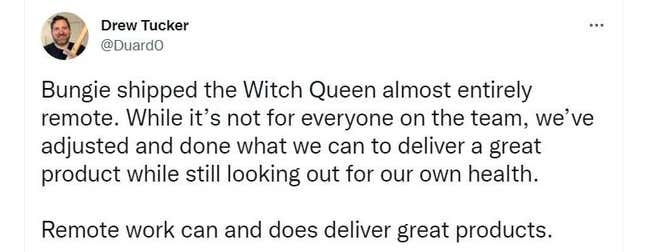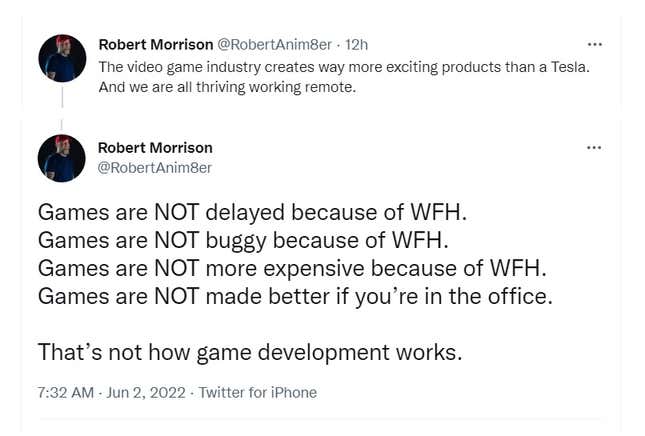
The Ls are stacking up for Elon Musk. Tesla’s shitposter-in-chief got ratio’d over the weekend for trying to dunk on a satirical gaming site and is now taking heat for an incredibly aggro company email about how remote work is for lazy frauds. A lot of people in the tech world aren’t having it, including some game developers who are now defending the virtues of remote work in the face of the billionaire’s smug dismissal.
Musk’s recent email to Tesla executive staff leaked yesterday on Twitter with the subject line “Remote work is no longer acceptble [sic].” It went on: “Remote work is no longer acceptable, Anyone who wishes to do remote work must be in the office for a minimum (and I mean *minimum*) of 40 hours per week or depart Tesla. This is less than we ask of factory workers.”
A judge recently ordered Tesla to pay $15 million to a worker who faced racial harassment at the factory, and Shanghai staff were reportedly recently asked to stay overnight in sleeping bags. Tesla did not respond to a request for comment. [Update: 6/3/22, 10:05 a.m. ET: Musk revealed today that Tesla is laying off 10% of its staff because he has a “super bad feeling” about the economy.]
Musk, still the richest person in the world despite Tesla stock being down over 30% year-to-date, wrote in a follow-up email, “There are of course companies that don’t require this, but when was the last time they shipped a great new product? It’s been a while.”
Actually it hasn’t been, at least in the case of some big game studios which, product and software-wise, are technically very much in the same tech space as Tesla. While Musk’s jab was likely aimed at Apple and other tech giants, game developers who have indeed recently shipped “a great new product” were quick to weigh in.
“Bungie shipped the Witch Queen almost entirely remote,” Drew Tucker, accessibility co-lead at Destiny 2 maker Bungie, wrote in a tweet shared by CEO Pete Parsons and many others. “While it’s not for everyone on the team, we’ve adjusted and done what we can to deliver a great product while still looking out for our own health. Remote work can and does deliver great products”
“The video game industry creates way more exciting products than a Tesla,” wrote PlayStation animator Robert Morrison. “And we are all thriving working remote.” A writer from Eidos Montreal, meanwhile, pointed out that her team’s “ideas and innovations” weren’t suffering as a result of cutting down on long office commutes.


Over a year into pandemic work from home requirements, Eidos released Guardians of the Galaxy in fall 2021. It didn’t light up the sales charts, but it was an all around excellent blockbuster that made several game-of-the-year lists (including Kotaku’s). In addition to flexible remote work, the studio also announced last year it would move to a 4-day work week, reducing hours but not pay.
Bungie’s another notable company that’s adjusted during the pandemic years. In April it announced a “digital-first” approach to hiring, with plans for many current and future roles to become eligible for full remote-work. The Witch Queen, a high-water mark for Destiny 2 expansions, bolstered the case for more flexibility. And other competitors like CD Projekt Red, which is currently staffing up for a new open world Witcher game, are following suit.
But it’s clear not everyone in the gaming industry agrees. Even if they might not word it as contemptibly as Musk, companies from Riot Games to Activision Blizzard have pushed in various ways to get back to working the way they used to (because that was already working so well for them). Doing so, however, has threatened to speed up the loss of talent at places already strapped for talent.
“As more game dev studios are deciding to be hardasses about forcing people back into physical offices, it’s not at all surprising that devs - especially experienced ones - are saying, ‘Nah I’m good,’ and just leaving for more flexible studios,” Josh Sawyer, design director at Obsidian, wrote on Twitter last month. Those could include indie studios like Vodeo Games and the newly formed Possibility Space, which allow developers to live and work from anywhere.